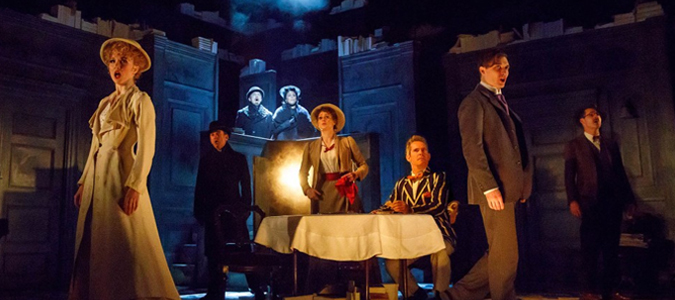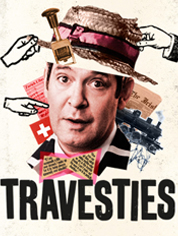

Travesties
Opening Night: April 24, 2018
Closing: June 17, 2018
Theater: American Airlines
The Tony Award-winning Best Play returns to Broadway in a “near-miraculous production” of “mind-bending splendor” (The New York Times). In 1917 Zurich, an artist, a writer and a revolutionary collide in a kaleidoscope thrill-ride that’s “wickedly playful, intensely entertaining, infectiously theatrical” (Time Out London). Roundabout reunites with playwright Tom Stoppard (The Real Thing) and director Patrick Marber (Closer) for a dazzling revival from London’s Menier Chocolate Factory (The Color Purple). 2017 Olivier nominee Tom Hollander leads the cast.
READ THE REVIEWS:
April 24, 2018
You might want to do a bit of homework before seeing the Broadway revival of Travesties. Perhaps a little digging into the history of the Russian Revolution and the reasons for the first world war. Then you should refresh your memory of the early 20th century avant-garde art movement known as Dadaism. A rereading of Oscar Wilde’s The Importance of Being Earnest is a must. And if you have the time, finally finishing James Joyce’s Ulysses wouldn’t hurt. If all that sounds a bit daunting, worry not. You don’t have to enroll for a graduate degree to enjoy Tom Stoppard’s simultaneously wacky and intellectual 1974 comedy, now being given its first-ever Broadway revival by the Roundabout Theater Company. That’s largely due to the accessible nature of director Patrick Marber’s rollickingly staged production, which garnered raves for its London stints at the Menier Chocolate Factory and the West End. The handy crib sheet provided in the program doesn’t hurt either. The set itself announces just how heavily the play will draw on literary references. It’s a cross between a library and a drawing room brimming with stacks of books and sheets of paper that litter the stage like confetti. The evening is structured as a memory play narrated by an elderly, low-level British servant, Henry Carr (Tom Hollander, TV’s The Night Manager), recalling his experiences 50 years earlier in 1917 Zurich.
READ THE REVIEWApril 24, 2018
Senility is a joy ride in the exultant, London-born revival of Tom Stoppard’s “Travesties,” which opened on Tuesday night at the American Airlines Theater. This account of a clash of three cultural titans — James Joyce, Vladimir Lenin and the Dadaist poet Tristan Tzara — in Zurich during World War I is related decades later by an ancient witness (one Henry Carr, of the British Consulate). His recollection is, to put it kindly, capricious.
Yet the mind of this old man (played with a gourmand’s gusto by Tom Hollander) is filled with such bright bits of history, real and imagined, that whenever he tries to remember, his thoughts erupt like showers of confetti. My advice to anyone attending this show of rollicking intellect and silly stagecraft, which has been deliciously directed by Patrick Marber: Let it rain and soak it in.
By evening’s end, you’ll be surprised by the iridescent clarity that has emerged from Mr. Stoppard’s artfully chaotic assemblage of rampant speculation, literary texts, great-man biography parodies, legal documents, political tracts and rude schoolboy japes. That clarity won’t last, any more than a rainbow does.
READ THE REVIEWApril 24, 2018
April 24, 2018
Tom Stoppard’s Tony-winning 1974 play Travesties, stuffed thick as a English gentleman’s armchair, its ideas on art, war, patriotism and purposeful nonsense fashioned into a nonstop tourney of wit and erudition, has often been called a brainteaser, but brain tickler comes so much closer to the jubilant staging presented by Broadway’s Roundabout Theatre Company. Directed by Patrick Marber and starring Tom Hollander, this Travesties arrives at Roundabout’s American Airlines Theatre following its well-received 2016 London staging, its mostly new cast missing not so much as a breath or a notion. The play, which points to the luxurious density of Stoppard’s later masterworks Arcardia and The Coast of Utopia, launches with a hang-on-tight monologue delivered by Henry Carr (Hollander), an aging British consul whose first claim to literary immortality was a passing mention in James Joyce’s Ulysses (the second? Travesties, of course).
READ THE REVIEWApril 24, 2018
In the Roundabout Theatre Company’s Broadway revival of “Travesties,” a sign (“Ruhe Bitte”) on the show’s set advises us to please be quiet in the Zurich reading room where Tom Stoppard’s 1973 comedy takes place. But you can forget about that, because the sound of laughter can’t be contained. Written when the playwright (“Arcadia,” “The Coast of Utopia”) was a mere stripling, this extravagant farce bristles with clever wordplay, from Joycean limericks (“There was a young man from Dublin ….”) to Wildean epigrams. (“I have always found that irony among the lower orders is the first sign of an awakening social consciousness.”) One dazzling scene, in fact, is written entirely in limericks. Fun on its own etymological terms, this madcap comedy also tips its hat — a beat-up straw boater with a jaunty red hatband — to the spirit of revolution that galvanized Europe in 1917. The War to End All Wars, as the First World War was ironically mis-named, was raging in Europe at the time, while Russia was still in the throes of becoming the Soviet Union.
READ THE REVIEW





















